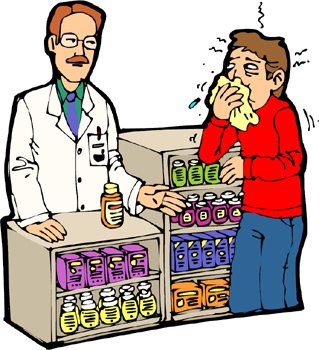Common Cold Blues. By Our February Student Pharmacist, Ashley Sullivan, Who Sadly Has Suffered Her Share of Colds and Stuffiness This Month.
It’s that time of year: the common cold has set in and if you haven’t had it yet, you probably will soon—or maybe you’re one of the unlucky ones who have already had it multiple times.
This winter has been a time of illness for many people and everyone seeks over-the-counter (OTC) medications to help them get through their day-to-day living activities. But which products should you actually buy? The cough and cold aisle at your local pharmacy can be daunting. Advil cold and sinus, Nyquil, Tylenol cold, Mucinex DM, Allegra D….the list goes on!
The key to picking a product that will help get you through the misery of being ill is identifying which symptoms you have and what you need to treat them. Combo products are great if you have all the symptoms, but you may be taking unnecessary medication or missing something you could benefit from.
If you’re ever confused about what you should take, don’t forget to seek help from your pharmacist. Following is a list of common cold symptoms and the drugs that treat them so you can make an informed decision when treating yourself.
For aches and pains and a fever that is 100.5 degrees or higher, Tylenol (acetaminophen) is the best choice.
For a sore throat, gargle salt water as often as you like (1/2 tsp salt in one cup of water) or use products like Cepacol which may help numb the area – be careful, though, lozenges can be a choking hazard.
For sinus congestion (stuffy nose), pseudoephedrine is the best choice. It’s behind the counter in the pharmacy. All products that have “D” in their name contain pseudoephedrine. Oxymetazoline (Afrin) nasal spray is also helpful, but you should only use it for three days! More than three days use may result in rebound congestion which worsens mucus and congestion. Another OTC choice is phenylephrine, a similar product to pseudoephedrine, but which doesn’t work as well; however, it’s an option if you have to buy something when the pharmacy is closed.
For chest congestion, guaifenesin (Mucinex) is the only medication option. If you feel like you can cough mucus up, this may be a good choice. Running a humidifier or vaporizer also helps with chest and sinus congestion. Vicks vapor rub is a topical option to break up congestion.
For cough suppression (if coughing is preventing you from sleeping, talking, or completing daily tasks), dextromethorphan is the medication you’ll need. Products that have “DM” in their names contain dextromethorphan.
For runny nose and watery eyes, take an antihistamine. Non-drowsy antihistamines include cetirizine (Zyrtec), loratadine (Claritin), and fexofenadine (Allegra). The most common sedating antihistamine is diphenhydramine (Benadryl), but others you may see in combo products include doxylamine, chlorpheniramine, and brompheniramine. Sedating antihistamines may also help suppress coughing and encourage sleep.
Overall, eating a balanced diet and taking vitamins helps prevent colds and fight them off once you have one.
Eating spicy foods or hot soups may help break up mucus and congestion.
Zinc may shorten the duration of the cold if taken during the first 24 hours after symptoms start.
Drinking plenty of water is very important to keep your body hydrated. Water also helps break up mucus and congestion, as well.
Aromatherapy may help with some cold symptoms, as well. Eucalyptus (diluted) applied to the chest helps with chest congestion. Peppermint or eucalyptus (inhaled) helps with stuffiness. Lavender, cedar, and lemon (diffused) may soothe nasal passages. Inhaling menthol also helps break up sinus congestion. Essential oils should be of good quality and used as directed on packaging labels. Any questions or concerns should be addressed with a physician.
http://www.webmd.com/cold-and-flu/which-medicine-help?page=2
http://www.webmd.com/cold-and-flu/understanding-common-cold-treatment
http://www.english-online.at/news-articles/health-medicine/cure-for-common-cold.htm


